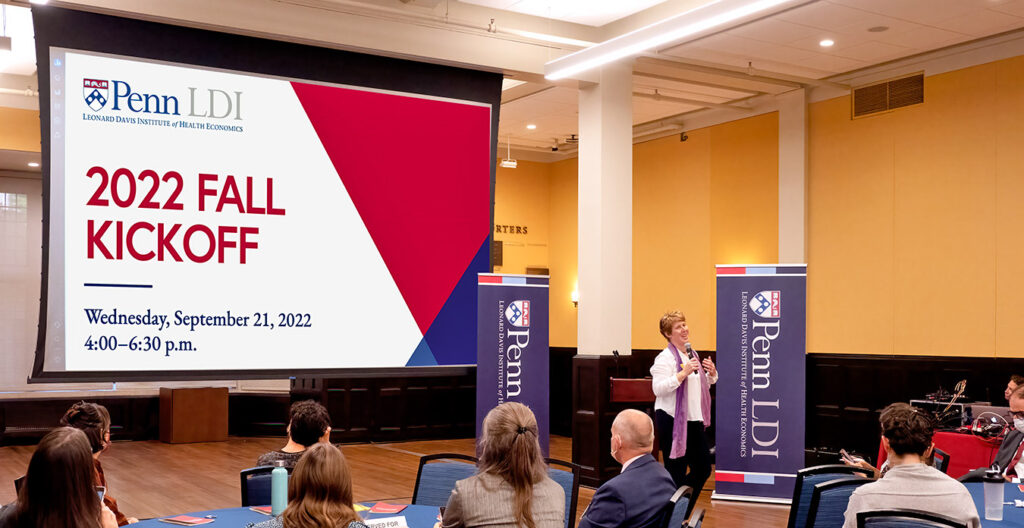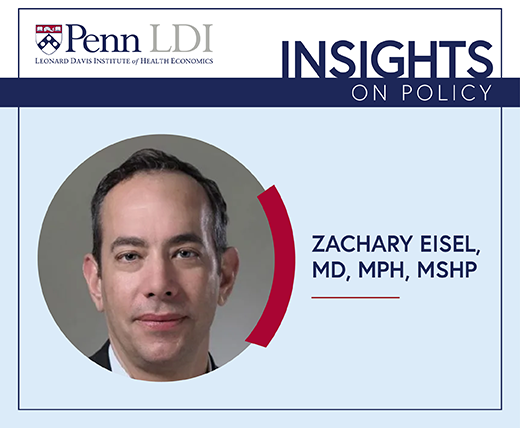
Over 500 U.S. Hospitals Have Stopped Delivering Babies Since 2010
A Crisis in Maternal Care is Unfolding—and it’s Hitting Rural and Urban Communities Alike
News

A major service of the Leonard Davis Institute of Health Economics during its 55-year history has been the facilitation of multidisciplinary collaboration among its hundreds of Senior and Associate Fellows. The annual LDI Fall Kickoff is one of the ways it achieves that by introducing new fellows and providing them with a speed-dating-like venue to briefly describe themselves, their work and their collaboration interests. The 2022 Kickoff that took place on September 21 in Penn’s Houston Hall was the first in-person version since 2019. Taking the stage were these 17 new fellows and health services researchers from Penn’s Perelman School of Medicine, Wharton School, School of Nursing, School of Social Policy & Practice, Children’s Hospital of Philadelphia, and the Weitzman School of Design:
Shoshana Aronowitz, PhD, MSHP
Assistant Professor, Family and Community Health, Penn Nursing

Innovative Models of Opioid Use Disorder Treatment
Fun fact: Shortly before the pandemic, Shoshana Aronowitz survived a hot air balloon crash landing in Albuquerque, New Mexico. Her slides showed the happy passengers just before lift off, followed by a panoramic aerial view of the landscape below, then the balloon’s empty passenger compartment basket lying sideways in a desolate desert field. A second-year Assistant Professor in the Penn School of Nursing’s Department of Family and Community Health, Aronowitz’s clinical and research work broadly focuses on opioid use disorder treatment. She’s interested in innovative care delivery models, telehealth, mobile services and mail-based programs. She has started to move her work into intervention development and would like to expand it further into different areas including older adults, adolescents and LBGTQ populations.
Emily Becker-Haimes, PhD
Assistant Professor, Psychiatry, Perelman School of Medicine

Physician Stress and Effective Care Delivery
Appearing from COVID-19 isolation via Zoom, Emily Becker-Haimes’ fun fact is that she is a super fan of Bluey on Disney+, which she watches with her child. The cartoon series features the uplifting adventures of a family of Blue Heeler dogs. Clinical Director of Penn’s Pediatric Anxiety Treatment Center at Hall-Mercer (PATCH) in Center City, Becker-Haimes is a clinical psychologist and implementation scientist. “I’m particularly interested in thinking about how clinicians’ stress might get in the way of effective care delivery,” she said. “I’m designing strategies and interventions to support clinicians in the management of their stress more effectively in these environments. On the clinical side, I’m really thinking a lot about how to take more of a public health lens and oriented approach to addressing the current children’s mental health crisis.”
Patrick J. Brennan, MD
Professor of Medicine, Perelman School of Medicine

Health System’s High Reliability Journey Strategy
Chief Medical Officer of the University of Pennsylvania Health System, Patrick Brennan’s fun fact was a pitch for participants for the 11th annual 5K for the IOA run fundraiser for Institute on Aging-related pilot research at Penn. The infectious disease physician noted that he “sits on a pile of data” and is willing to collaborate with interested researchers. He oversees health care quality strategy for the Health System and outcomes in many areas, including the Office of Medical Affairs that privileges, credentials and enrolls physicians. He also oversees graduate medical education and the Center for Health Equity Advancement that deals with Philadelphia’s public health agencies. Brennan is currently working on the Health System’s “High Reliability Journey” strategy and is open to collaborations on the implementation and outcomes of that project.
Tamara J. Cadet, PhD, MPH
Associate Professor, School of Social Policy & Practice

Screening Aids for Colorectal Cancer
Public health social work researcher Tamara Cadet’s first fun fact is that she binge watches Marvel superhero movies for The Avengers, Spider-Man, and The Flash. The second is that she became an avid tent and sleeping-bag camper in Boston and is now searching for good campgrounds in the Philadelphia region. Her research focuses on the health disparities of older people in underserved communities. She is currently funded by the National Institute on Aging to modify and evaluate a colorectal cancer screening decision aid for older adults at risk for low health literacy. “We have essentially taken an existing decision aid for a target population, torn it apart, and redeveloped it based on patient feedback about what makes sense to them and what words make sense to them versus words that make sense to us,” she said.
Rebecca Clark, PhD, RN
Assistant Professor, Family and Community Health, Penn Nursing

Improvements in Inpatient Maternity Care
Nurse, midwife, and health services researcher Rebecca Clark’s fun facts include winning a strongman powerlifting competition, owning enough books to qualify as a library in New York state, and discovering the best vegan chocolate chip cookie recipe (which she’s willing to share). Her work focuses on hospital nursing resources, such as the work environment and staffing, as modifiable levers for systemic change and improvement in inpatient maternity care. “I’m very interested in birth outcomes, especially cesarean section and spontaneous vaginal birth variation across hospitals — high-performing hospitals especially,” she said. “We’ve found hospitals where Black women have better outcomes or equal outcomes with white women. So we want to know: ‘what are those hospitals doing that’s different?’ It’s really exciting work.”
Danielle Cullen, MD, MPH
Assistant Professor, Pediatrics, Emergency Medicine, Children’s Hospital of Philadelphia

Integrating Social Care into Medical Care
A faculty member at PolicyLab and Co-Course Director for Master Level Introduction to Implementation Science at the Penn Implementation Science Center, Danielle Cullen’s fun fact is that she “loves all things water.” Her research focuses on developing interventions to reduce socio-economic health disparities. “My goal is to integrate social care into medical care in a way that we can reduce unmet social needs for patients with families. There is increasing policy and payer pressure for screening protocols looking at things like food insecurity and homelessness. But this can come with unintended consequences for patients and families. I’d love to collaborate with anybody who can bring more quantitative expertise because I sit on a lot of data from these programs and know there is so much we can do with this data for the benefit of families.”
Meredith Doherty, PhD, LCSW
Assistant Professor, Social Work, Non-Profit Leadership, School of Social Policy & Practice

Financial Burdens of Serious Illness
As part of her “nerdy need” to explore anthropologically and sociologically innovative experiences, Meredith Doherty’s fun fact is that she is a member of the emergency mental health team at the annual Burning Man event in the Nevada desert. An oncology and palliative care social worker, she studies the financial burdens of serious illness and is currently running a randomized controlled trial providing unconditional cash payments to low-income advanced cancer patients. “I focus on stuff at the direct practice level where cash is a very useful tool. It moves through system levels so agilely. I’m writing a grant with a piece on cost effectiveness, something I don’t know much about. So, I’d be interested in finding collaborators with expertise in policy-focused implementation science, cost effectiveness, and cost benefit analysis.
Oluwadamilola (Lola) Fayanju, MD, MA
Associate Professor, Surgery, Perelman School of Medicine

Metrics and Measures of Equitable Care
As a fun fact, Oluwadamilola (Lola) Fayanju described herself as a “lapsed humanist with a Masters in Comparative Literature” who also has a wide and varied taste in music. Chief of Breast Surgery for the University of Pennsylvania Health System, Fayanju is also Surgical Director of the Rena Rowan Breast Center, and an Innovation Faculty member at the Penn Center for Cancer Care Innovation (PC3I). “I would love to work with people who are familiar with frameworks and implementation science for promoting equity-focused implementations,” she said. “That is really where I think my work is going next. I would also love to find someone to work with on the development of metrics, measures of equity and measures of equitable care. And I want to think about meaningful ways in which to engage with community-based partners.”
Amy Hillier, PhD, MSW
Associate Professor, Social Work, School of Social Policy & Practice

Scales and Screening Protocols for Childhood Transgender Behavior
Amy Hillier, the founding director of the cross-school graduate LGBTQ certificate program at the Penn Carey Law School, noted that her fun fact was that “as a researcher and faculty member, I was completely challenged by being the parent of a transgender kid, which really nothing prepared me for. It’s been this amazing journey, and some colleagues in Philadelphia have made that a really wonderful journey.” It has also refocused her research. “Despite the history of screeners being used to pathologize and underscore difference, can we use screeners with parents of young children to help normalize a broader range of gender behaviors and also to identify families like mine that really do need some additional resources?” she said. Hillier would like to find collaborators experienced in developing scales and screener protocols appropriate for her work.
Summer Kaplan, MD, MS
Assistant Professor, Radiology, Perelman School of Medicine

Point-of-Care Ultrasound Diagnostic Innovations
The fun fact of the Director of Pediatric Emergency Radiology at the Children’s Hospital of Philadelphia (CHOP) is that she has recently begun to learn the accordion. From a musical family, and now with her own musical family, Kaplan noted that her husband and two children play multiple instruments — and she would like to join them. Beyond her new musical career, she is also hoping to find collaborators to participate in her work on cost estimation tools and price transparency in health care. The Director of CHOP’s Point-of-Care Ultrasound (POCUS) program, Kaplan is also interested in collaborators interested in Medicare policy and the rapidly growing new POCUS field made possible by the advent of smaller and more affordable ultrasound machines that can be used at the emergency room bedside by non-radiologists.
Sameed Khatana, MD, MPH
Assistant Professor, Medicine, Perelman School of Medicine

Food Policy, Housing Policy, Environmental Health, and Homelessness
A cardiologist at Philadelphia’s Crescenz VA Medical Center, Sameed Khatana’s fun fact is about global travel. His latest transoceanic adventure was in Patagonia. He’s also a big soccer and Formula One racing fan. A former fellow at the Center for Medicare and Medicaid Innovation (CMMI), Khatana’s research focuses on health economics, quantitative evaluation of health policies, quality designation of health providers, and disparities in cardiovascular care. “Our group has access to a lot of different data sets, including Medicaid claims data,” said Katana. “For those interested in public policy analysis, I’ve done work on Medicaid, food policy, housing policy, environmental health, and homelessness.”
Austin Kilaru, MD, MSHP
Assistant Professor, Emergency Medicine, Perelman School of Medicine

Connecting Patients to Social Services and Public Benefits
Austin Kilaru’s fun fact is that between college and medical school he was a musician who sang songs about vegetables — but he won’t reveal the YouTube links. An emergency physician at Penn Presbyterian Medical Center, his research focuses on transitions from emergency department care to outpatient services and policy interventions to support treatment for opioid use disorder. “Many of you view the ED as the place to be avoided and measure outcomes about preventing vists,” he said. “That’s great, but people still come into the ED, and we have to figure out ways of integrating the work and the value reassortment into the broader health care system. I’m doing new work to connect patients with social services and other public benefits that are not health related. So I’d love to connect with collaborators who know more about social services.”
Alex Rees-Jones, PhD
Associate Professor, Business Economics and Public Policy, The Wharton School

Bias and Imperfect Cognition’s Effect on Economic Policy Analysis
A former avid skier and river rafter when he was growing up in Colorado, Alex Rees-Jones said his contemporary fun fact is that “I write papers and raise children.” The health economist who teaches business economics and public policy at the Wharton School is also a Faculty Research Fellow at the National Bureau of Economic Research. His research focuses on how psychological biases and imperfect cognition affect economic policy analysis. A major area of interest is public finance, examining how citizens’ imperfect response to tax incentives affect the assessment of tax policy. “As a collaborator, my expertise is in trying to relatively quantitatively build more organic, soft, psychological issues and economic models,” he said. “I’m most interested in thinking about the interesting psychological elements economists are missing, and building them in.”
Halley Ruppel, PhD, RN
Research Assistant Professor, Family and Community Health, Penn Nursing

Integrating Medical Device Engineering Skills into Nursing
A Senior Fellow in the Penn Nursing Center for Health Outcomes and Policy Research (CHOPR), Halley Ruppel’s fun fact is that it was her birthday, and she was born in the same year (1986) that Halley’s Comet last passed by the Earth as it does every 75 years. Grounded in her background as a pediatric critical care nurse, her research focuses on the management of clinical alarm burden and unintended patient safety problems, such as clinician alarm fatigue. “I’m now interested in moving from descriptive research into interventions: implementation and cost analysis,” she said. “I’m also interested in projects that integrate humancentric design, and would like to find collaborators interested in the integration of technology into clinical care and nurses’ engagement with engineers to improve medical device usability.”
Megan Ryerson, PhD
Professor, City and Regional Planning, Weitzman School of Design

Engineering Safer Transportation Systems for Young people
A Professor of Electrical and Systems Engineering at the Penn School of Engineering and Applied Science, Megan Ryerson’s fun fact is she has been keenly interested in transportation since she took up distance running as a teenager in middle school. “It led me to explore the city and think about building safe and accessible transportation infrastructure,” she said. “I have very strong statistical spatial analysis and data science skills and this is really the core of my methodological transportation research. Also, in my department and in my own research, we really pride ourselves on our integration with the community. I’m always down to rant about underfunded transit and would be happy to find collaborators to rant together with. My work is very much about safe transportation and safe mobility for young people, and I invite others to join me.”
Michael Scott, MB, ChB
Professor, Anesthesiology and Critical Care, Perelman School of Medicine

Improving Postoperative Surgical Care
Michael Scott’s fun fact is that he was formerly a travel photographer with work published in National Geographic magazine. Now a Professor and Division Chief in Critical Care Medicine in the Perelman School of Medicine’s Department of Anesthesiology, he is recognized as one of the key inventors of the Enhanced Recovery after Surgery (ERAS) system that has become a standard of care for all surgical patients. “I’m chair of the Anesthesia Patient Safety Foundation and trying to promote improvement in surgical quality for the deteriorating post-operative patient. When you think about how surgeries are the third leading cause of death in the US now, it’s a very important thing. I’m looking for collaborators because I’m hosting a meeting in November to work through economic modeling to generate a new level of care postoperatively.”
Li Shen, PhD
Professor, Biostatistics, Epidemiology and Informatics, Perelman School of Medicine

Developing AI Tools and Techniques for Alzheimer’s Research
Interim Director of the Division of Informatics, Li Shen’s fun fact is that he and his wife enjoy being engaged with their two sons’ sports activities. His research involves machine learning, medical image computing, biomedical and health informatics, network science, imaging genomics, multi-omic analysis and systems biology, health disparity, and big data science. Alzheimer’s disease has been a particular focus. “Our task is to look for therapeutic targets and then find a drug that can modify those targets,” he said. “So, we use AI and machine learning to analyze data from the major biobanks. We look at the genetics, the molecular data imaging data, and fluid biomarker conditioning behavior. We have a lot of data available along with expertise in the midst of all development. So I’ll be happy to work with anyone interested in these topics.

A Crisis in Maternal Care is Unfolding—and it’s Hitting Rural and Urban Communities Alike

Stable Payments Improved Margins But Not Liquidity, New LDI Analysis Finds

LDI Senior Fellow Cited for “Significant Contributions” in Research

Outdated Laws Target Black and Queer Lives in Over 30 States, Fueling a Deadly Disease

Selected for Current and Future Research in the Science of Amputee Care

Research Memo: Delivered to House Speaker Mike Johnson and Majority Leader John Thune